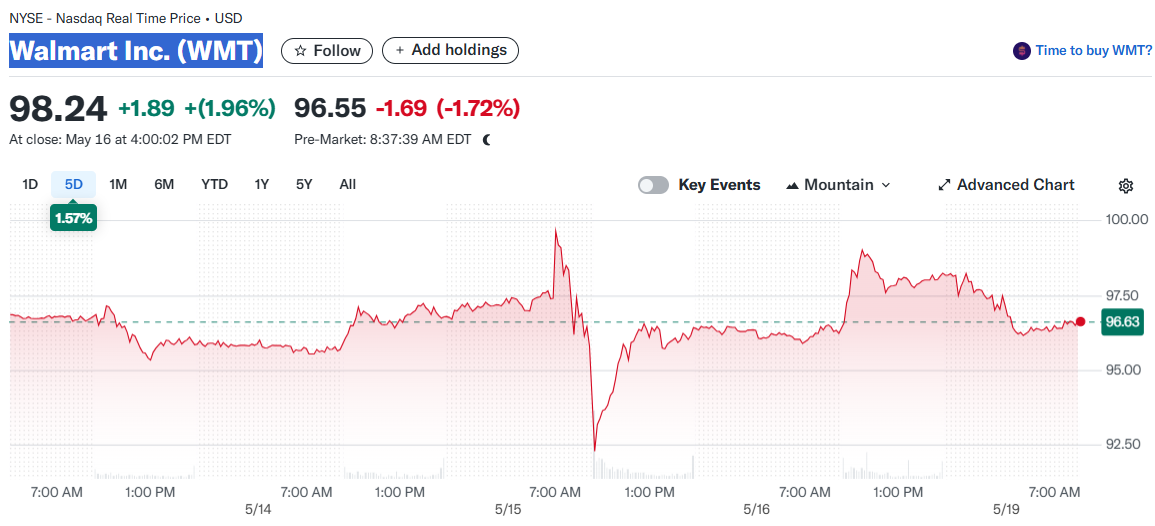TLDR:
- Walmart stock fell about 2% in pre-market trading after President Trump criticized the company for blaming price increases on tariffs
- Trump urged Walmart and China to “eat the tariffs” rather than raising prices for customers
- Walmart’s Q1 earnings beat EPS expectations but missed on revenue, with sales up 2.5% to $165.6 billion
- Raymond James maintained an “Outperform” rating with a $105 price target, citing Walmart’s diverse sourcing and inventory management
- Walmart’s e-commerce operations turned profitable globally for the first time, a key milestone for long-term margin expansion
Walmart shares took a hit Monday morning after drawing criticism from President Donald Trump over the retail giant’s approach to tariff-related price increases. The stock dropped around 2% in pre-market trading following Trump’s weekend social media post demanding the company absorb tariff costs rather than passing them to customers.
“Walmart should STOP trying to blame Tariffs as the reason for raising prices throughout the chain,” Trump wrote on Truth Social. He pointed to the company’s profits, stating Walmart “made BILLIONS OF DOLLARS last year.”
The president’s message suggested both Walmart and China should “eat the tariffs” instead of charging “valued customers ANYTHING.”
Trump’s comments come just days after Walmart reported its first-quarter earnings for fiscal year 2026.
The results were mixed as consumer spending showed caution in the uncertain economic climate.

Earnings Results and Outlook
First quarter sales increased 2.5% year-over-year to $165.6 billion, which fell short of Wall Street’s expectations of $166.02 billion.
However, adjusted earnings per share grew 1.7% to $0.61, beating analyst estimates of $0.58.
US same-store sales rose 4.5%, outperforming forecasts. Growth was led by the health and wellness category, along with grocery sales.
The company maintained its full-year earnings guidance of $2.50 to $2.61 per share. This range falls mostly below analyst expectations of $2.61.
Walmart added a caveat to its outlook. It noted earnings growth would be challenging if US tariff rates on Chinese goods return to higher levels.
The company also indicated it might take a more cautious approach to the holiday season depending on back-to-school shopping performance.
Tariff Concerns and Price Increases
Walmart CFO John David Rainey addressed tariff concerns directly in recent comments to Yahoo Finance. “Low prices is what we stand for, and we’re going to keep prices as low as we can as long as we can,” he stated.
Rainey warned price increases would become noticeable later in May. He specified that items facing a 30% tariff would likely see “double digit” price hikes.
The most affected product categories include baby strollers, furniture, and toys. A Walmart spokesperson responded to Trump’s criticism by stating: “We have always worked to keep our prices as low as possible, and we won’t stop.”
Strong Analyst Support
Despite the presidential criticism and tariff concerns, Wall Street remains largely positive on Walmart stock. Raymond James reaffirmed its “Outperform” rating on Monday with a price target of $105.
The firm highlighted Walmart’s diverse sourcing, strategic inventory management, and integrated eCommerce model as key strengths. According to Yahoo Finance data, about 91% of analysts covering Walmart rate the stock a buy or strong buy.
RBC Capital Markets analyst Steven Shemesh maintained an “outperform” rating, noting “WMT is among the best positioned in our coverage to mitigate the impact of tariffs.”
Digital Growth and Profitability Milestone
Analysts are particularly encouraged by Walmart’s progress in high-margin revenue streams. The company reported a 50% increase in advertising revenue and 15% growth in membership.
A major milestone was reached as Walmart’s e-commerce operations turned profitable globally for the first time. Raymond James views this achievement as crucial for long-term EBIT margin expansion.
The firm expects Walmart to continue experiencing operating income growth at a rate surpassing sales growth. This outlook is driven by the company’s shift toward digital, data, and automation-led initiatives.
Walmart stock has been a top market performer over the past year, rising 54% compared to the Dow Jones Industrial Average’s 6% advance.
The current US-China tariff situation sits at 30%, down from 145% at the peak of trade tensions between the two economic powers.
The Trump administration and China agreed to reduce tariffs for 90 days last week, providing some temporary relief for retailers like Walmart.






